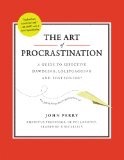The Art of Procrastination: A Guide to Effective Dawdling, Lollygagging and Postponing,
Perry, John
I began my formal relationship with the notion of procrastination at the age of 12. I was in my room working on a model plane instead of my homework. My dad came in and asked me to look up the word “procrastination”; without lifting my head or skipping a beat, I answered “sure, I’ll do it later.” The model parts were pushed aside and the dictionary landed on my desk. I was invited to read the definition aloud.
I read this slim volume in 2013, which confirms that I am part of its target audience. Written by Stanford philosopher John Perry, The Art of Procrastination is largely tongue-in-cheek but contains some of the most useful advice for living with procrastination that I’ve encountered since my abrupt introduction in my youth. Perry recommends a basic coping strategy that accepts the reality of putting things off and leverages a small bit of self-deception to actually manage to get things done. He labels his strategy “structured procrastination” and argues that procrastinators “can be motivated to do difficult, timely, and important tasks… as long as these tasks are a way of not doing something more important.
This will seem counter-intuitive to those who don’t routinely procrastinate. For those of us who do, however, this finally makes sense out of how we’ve ever managed to get anything done.
Perry offers other useful insights as well. For example, he differentiates between horizontal and vertical organizers; those whose work needs to be spread out to see versus those who can effectively file things away in cabinets when they aren’t pertinent to the task at hand. He also offers an intriguing take on perfectionism and procrastination. The impact of perfectionist thinking isn’t in soaking up time in endless cycles of tweaks and revisions. The impact comes from fantasies of producing the perfect deliverable preventing the procrastinator from starting the prosaic work of turning out a serviceable product. That was an insight that hit a little too close to home.
If Perry’s notions of structure procrastination ring true for you, add this slim volume to your pile and read it as a way to avoid working on some other pressing task.
